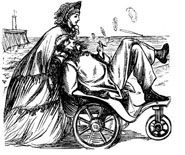
The Stage as a Moral Force
A BUTTRESS TO LAW & RELIGION
Socrates believed that poets tell corrupting lies about men and the gods. Jeremy Collier assailed theater for its immorality and profaneness. But there was a visionary who perceived theater to extend beyond the realm of law and religion by teaching rather than punishing, demonstrating rather than preaching. He believed theater can encourage us to fraternize in a universal sympathy and bring us nearer to our heavenly disposition. That man was Friedrich Schiller (1759-1805). Schiller, a German dramatist and philosopher, is perhaps best known for Die Räuber (1781), an emotional drama regarding the conflict between two aristocratic brothers. His Die Jungfrau von Orleans (1801), a romantic tragedy, was also highly acclaimed. Its heroic characterization of St. Joan of Arc allowed him the opportunity to display his bold imagination — and his imperturbable optimism. The unambiguous moral issues in Schiller’s dramas appealed to German audiences until changing times and mores caused his popularity to wane, especially following the Franco-Prussian War. His principles of high moral conduct, noble idealism, and optimism were seen to belong to the period before the French Revolution rather than to the liberal and material age that followed. Still, Schiller’s essay “The Stage as a Moral Institution” remains a work we should ponder, for it expresses truths more urgent now than ever before and points the way forward for artists of the future.
Schiller’s 1784 essay proposes the stage as a moral force, one that strengthens laws and religion. Though laws are capricious and religion might wane, the stage is relatively constant; it is where “virtue and vice, joy and sorrow, are thoroughly displayed in a truthful and popular way; where a variety of providential problems are solved; where all secrets are unmasked, all artifice ends, and truth alone is the judge,” Schiller writes. And immediately we marvel, nearly two and a half centuries later, at what a beneficial role the stage served. But even if we are speaking of high theater, was Schiller’s representation truly reliable, or was he being merely hopeful?
Earlier theorists such as Martin Opitz (1597-1639) and Andreas Gryphius (1616-1664) viewed tragedy as teaching a stoic resignation to the workings of fate. Later theorists were less inclined to endow theater with a moral purpose. Johann Elias Schlegel (1719-1749), for example, believed that pleasing an audience was of superior importance, while Johann Gottfried Herder (1744-1803), a contemporary of Schiller, emphasized the freedom of genius. He believed Shakespeare’s genius, for instance, might excuse almost any flaw. Another contemporary, Gotthold Ephraim Lessing (1729-1781), both a playwright and theorist, maintained that the dominant element of tragedy was pity. Curiously, Lessing was of the opinion that there never had been a play in which a Christian was of interest as a Christian. Such a play, he claimed, would be untheatrical because gentle pensiveness and unchangeable meekness do not conform to tragedy’s striving to purify passions with passions. In particular, he says, the Christians in Johann Friedrich von Kronegk’s Olindo and Sophronia (1758) fail to arouse admiration or pity, because too often they proclaim their martyrdom as something facile. Lessing also believed audiences were enamored of action, regardless of morality. In his view, a play is successful if its villains are less inveterate and clearer in purpose.
Schiller notes that whereas law and religion might proscribe certain crimes, witnessing their portrayal on stage, or the consequences thereof, is a more powerful preventative — for example, Medea’s terrifying by killing her children, and Lady Macbeth’s horrifying when washing her hands of murder. And we might believe these reactions even today, trusting to a time more primitive than our own, because we sense the propriety of these more natural sentiments of a distant yet dignified civilization. I would further say that whereas these reactions might have been true in societies where such crimes were rare or unknown, they might not be as prevalent in societies where infanticide or murder are common, for such occurrences tend to habituate us to these crimes. Thus, our reaction today to staged portrayals of these practices might not be so intense. French playwright Alexandre Dumas (1802-1870), in fact, suggested this when he spoke of plays that present “manners as they are, passion as it exists, crime as it is hidden” to a public that recognizes itself “as in a mirror,” where an audience’s reaction might be of an opposing nature. For here it “frowns instead of laughs, attacks instead of approves, and growls instead of applauds.” This is where we are now. And yet, in the heart of every decent human, there is an impulse deploring murder, ancient or modern, as something unfit for civilized society and humane existence.
You May Also Enjoy
The Secret Weapon in the War on Terrorism: Priestesses!... Apologize for Making 'Hurtful' Remarks? No Way!... Fire Alarms in the Night... Episcopal Fundamentalism in the Catholic Church...
The home, the sacred and productive realm of women, was made obsolete. For children the sacred space of home for growing, learning, and loving rapidly disappeared.
Without the acceptance of a basic moral code such as the Decalogue, man, because of his intelligence, becomes far worse than mere beasts.

